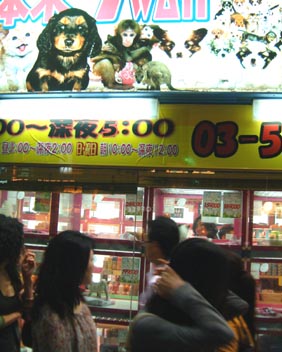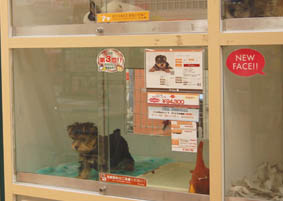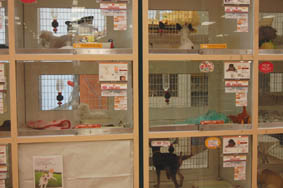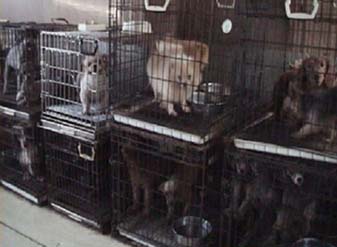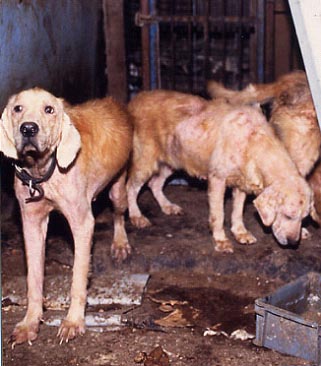 |
   |
| HOME > Companion Animals > The Reality of Pet Industry |
|
|
|||||||||
ALIVE
All Life In a Viable Environment
5-18-10-102, Honkomagome, Bunkyo-ku, Tokyo, 113-0021
Japan
Tel.+81-3-5978-6272
Fax..+81-3-5978-6273
![]()
Anti Vivisection Action Network
ALIVE News 2009-11-12 In September 2009, “News Japan” (Fuji
Television) reported on a serial program called “Where Life
Exists,” which was about the pet industry in Japan. The first
show focused on some pet shops are open past midnight until early
in the morning. They sell puppies and kittens that are too young
to be sold. The second exposed the reality of breeders, showing
how corrupt they are and how they neglect and abuse animals at their
facilities. The last showed abandoned dogs and cats that are destined
to be disposed of. Tell us about pet shops that are open all night.
The standards and practices in Act on Welfare and
Management of Animals says, “depending on the situation, animals
should not be exhibited or displayed for long hours and appropriate
exhibiting schedules should be set in order to reduce stress on
animals.” "Depending on the situation" is a very
vague expression and makes it difficult to enforce the regulation. Is it correct that no specific durations are set when selling puppies?
The standards require to keep small puppies or kittens
that need nurturing with their parents and siblings for an appropriate
period of time. However this is also not happening. How can you recognize illegal practices by corrupted breeders? The Act on Welfare and Management of Animals defines
two types of abuse: The first one is intentional abuse, the second
one is care neglect. Since care neglect is not defined, police and
government officials do not become actively involved. In the video,
a dog dies because his leg got stuck in the cage and he could not
move. It is obviously a case of neglect, however it is very difficult
to prove it unless a veterinarian verifies it.
Mass production of puppies or kittens causes mass
disposal of the animals. A lot of breeders breed many different
breeds of dogs, this wide range of breeds makes it impossible to
provide adequate care for the animals. One solution is to make the
disposal fee expensive for breeders or animal handling businesses.
When a veterinarian puts a dog to sleep, it usually costs about
10,000 yen. In comparison, when the government accepts a dog for
disposal purposes from an individual owner or a breeder, it only
costs 2,000 yen. Can you tell us a little about local governments and their involvement? According to ALIVE’s survey, only 10% of local government require ID from those who come to drop unwanted dogs and cats. Only 39% of local government checks whether they are breeders or animal handling business owners. While the treatment of animals by individual owners has improved, abuses by unethical breeders still exists. It will be impossible to reduce the number of dogs/cats who are destroyed, unless unethical breeders are forced out of business or made to change their ways. Talk about how impulse shopping adds to the number of dogs/cats destroyed. When you buy a pet from a pet shop, you are helping
the breeding businesses and indirectly adding to the number of pets
destroyed. It is very important for consumers to know the reality
of the pet industry and start to chose not to buy pests at pet shops.
The gas chambers currently used used to destroy animals
were designed and put into use a long time ago, when there were
a million animals a year that needed to be destroyed. The old fashioned
facilities are decrepit and cause great pain and suffering to the
animals that are destroyed. The number of animals destroyed has
decreased and it is necessary to replace the method with something
more humane, such as using anesthesia. |
| |

